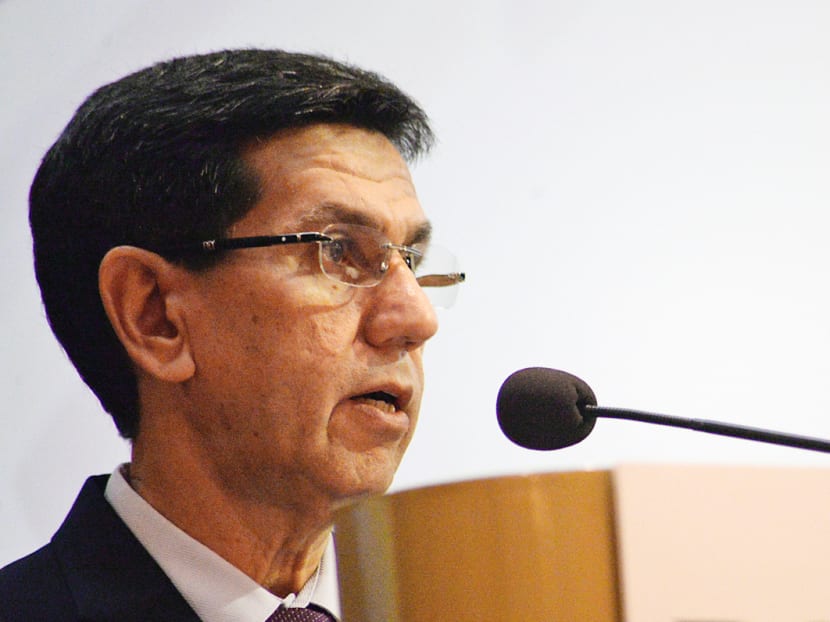Have an NMP represent the religious sector to enhance Singapore’s secularism: Panellist
SINGAPORE — Appointing a Nominated Member of Parliament (NMP) to represent the religious sector and give it a voice in the political realm could be a first step in enriching Singapore’s secularism, Mr Mohammad Alami Musa suggested on Thursday (Jan 14).

Mr Mohammad Alami Musa (pictured), a speaker at the Singapore Perspectives 2021 conference on Jan 14, 2021, said that Singapore can challenge itself to enrich its model of secularism by giving religious communities a space in the political realm.
SINGAPORE — Appointing a Nominated Member of Parliament (NMP) to represent the religious sector and give it a voice in the political realm could be a first step in enriching Singapore’s secularism, Mr Mohammad Alami Musa suggested on Thursday (Jan 14).
The president of the Islamic Religious Council of Singapore (Muis) was speaking at a virtual forum as part of the Singapore Perspectives 2021 conference organised by the National University of Singapore's Institute of Policy Studies (IPS).
He also said that Singapore can challenge itself to enrich its model of secularism by giving religious communities a space in the political realm.
“This rich diversity of religions, cultures and beliefs have a role to play, to contribute and enrich our public morality and public reason.”
When asked to elaborate on what he meant by Dr Mathew Matthews, who is the moderator of the forum and a IPS principal research fellow, Mr Alami clarified that his vision does not entail a Buddhist monk, a Christian priest or a Muslim imam entering the Chambers to speak.
Rather, the language of public reason has to be a qualifier for the religious representative.
“You don’t use sacred text or scripture to articulate your views and convey your wisdom in the public space. How do you use a language that can be well-received by all regardless of religious affiliation or regardless of whether you are religious or non-religious,” he added.
Mr Alami is Singapore’s non-resident ambassador to Algeria and also the head of studies in inter-religious relations with the S Rajaratnam School of International Studies’ plural societies programme.
Recognising that there may be criticisms of his suggestion and how it may lead to divisiveness, he said that there is no need to be anxious about that.
He pointed to a major rethink among religious scholars on the traditional idea that religion can never overlap with the state and politics.
“It’s not possible to take away religion — which is a big dimension of human life — away from people, even in public space,” he explained.
Adding on to Mr Alami’s suggestion, Dr Mathews asked whether those who do not identify with any religion, which is a growing proportion of people in Singapore, should also get a voice in Parliament.
To this, Associate Professor Daniel Goh, who is another panellist at the forum, said that there is no real need for either groups to be formally represented in Parliament through the NMP scheme.
Speaking from his experience as a Non-Constituency Member of Parliament (NCMP) from 2016 to 2020, Assoc Prof Goh said that the party whip is lifted for the ruling People’s Action Party when the House debates on controversial issues such as on abortion, or Section 377A, the law that criminalises men who have sex with men.
When it comes to voting in Parliament, lifting the whip allows members of the House to vote freely instead of toeing the party line.
Assoc Prof Goh, deputy head of the sociology department at the National University of Singapore, was selected to be NCMP at the time because he was among the Workers’ Party team of candidates that got the most votes among losing contestants during the 2015 General Election.
He pointed out that ideas from both religious and humanist standpoints already do get presented during these debates by elected MPs.
“I don’t see the need to represent these (viewpoints) and I think they are already brought to bear, at least in Parliament.
“I think the more interesting and important thing to think about is how do we increase this in public discourse, on the internet, on other kinds of public forum, to have different religious viewpoints and humanist viewpoints,” Assoc Prof Goh said.











